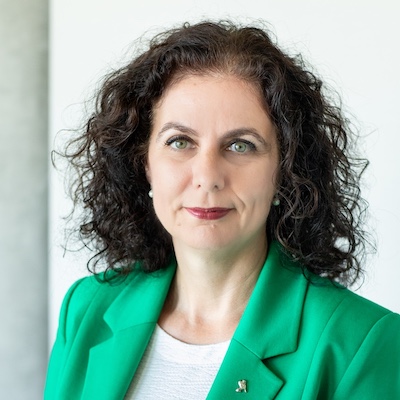Earlier this academic year, 23 educators from 13 countries joined the UW–Madison School of Education community as part of the Fulbright Teaching Excellence and Achievement (Fulbright TEA) program. The visiting teachers arrived from countries across Eastern Europe and Central Asia on Sept. 11 and stayed through most of October.
The Fulbright TEA participants attended academic seminars with a specialized focus on media literacy. While in Madison and as part of the program, the Fulbright TEA participants developed skills in media literacy and how to critically think about a range of issues in a global context. They also spent time in local school districts and got a taste of living in Madison with a range of fun, cultural activities like touring the Wisconsin State Capitol, visiting the Dane County Farmers’ Market, and celebrating with the School of Education at its annual Homecoming Tailgate event.
The program is funded by the U.S. Department of State, administered by IREX, and hosted by the School of Education’s Global Engagement Office.

Before departing, some of the visiting teachers shared their thoughts with the School of Education about their time via a Q&A. Following is what Maja Videnovik, who is from North Macedonia, shared about her experience:
Why did you apply for the Fulbright Teaching Excellence and Achievement Program?
Videnovik: The call for the Fulbright TEA program: Media Literacy Cohort was an excellent opportunity to strengthen my knowledge and skills in the field of media literacy and to explore current trends in education. Furthermore, I saw this experience as a chance to exchange expertise, experience, and information on diverse educational systems with other participants. The possibility of engaging in a USA high school setting, learning about the U.S. educational system and its approach to organizing curricular and extracurricular activities, and participating in it, was also a very important factor when I decided to apply for the program.
How would you describe your experience?
Videnovik: It was an extraordinary experience that influenced my professional development. I have gained knowledge and empowered my skills concerning the implementation of various strategies for teaching media literacy. Furthermore, I have learned a lot about the U.S. educational system and have managed to compare different educational systems, identifying good practices that can improve the quality of education. Last but not least, I have established good cooperation with colleagues from the USA and other program participants, creating a teacher network that will continue communication and collaboration in the future.
Is there a particular highlight that stands out to you from this program and your time in Madison?
Videnovik: I would emphasize the field experience in Verona Area High School, the opportunity to learn about the U.S. educational system and the school’s everyday work, and to learn from teachers and students there. The possibility of observing some classes and giving lectures has enriched my teaching practice, and I hope that I will have the opportunity to implement that at home.
I am very grateful to the organizers, Jamie Welling and Christina Eddington, for their support and guidance through the program activities. Well organized, very patient, always prepared to answer all the questions, providing tips for our free time — they were more than just organizers, but friends for a lifetime.
What is one thing you learned during your time in Madison that you hope to take back home and be able to implement it in your classroom there?
Videnovik: Participation in the Fulbright Program strengthened my knowledge and skills in the field of media literacy. I will try to implement various approaches, strategies, and digital tools learned during the program in my everyday practice. Furthermore, this experience deepened my cultural understanding, making me more effective at teaching students from various backgrounds and fostering a more inclusive learning environment. A sense of belonging and community is something that I would like to flourish in my school’s culture, too.
Similarly, what do you hope those on the UW–Madison campus and in the Madison community learned from you?
Videnovik: I think that the program offers opportunities for mutual learning and growth. By offering possibilities for culture lessons, the high school students got the possibility to learn about Macedonian culture. These presentations of Macedonian culture happened every day, not just in school, but during formal and informal communication with people in schools, the UW–Madison campus, and other people in our surroundings. During the sessions and in informal discussions, I had the opportunity to share expertise, experience, and good teaching practices, which I hope was beneficial to others.
What did you know about Wisconsin and the United States before coming to Madison? And how, if at all, have your perceptions changed about this state or the U.S.?
Videnovik: I had very little knowledge of Wisconsin and the USA before coming to Madison, gathered mainly through different kinds of media. Participation in this program has enriched my knowledge, showing me the diversity of the country, community spirit, and friendly attitude of the American people.
Is there anything else that you’d like to share about yourself or this experience?
Videnovik: The Fulbright TEA program was a life-changing experience that influenced my personal and professional life. I will share this experience on the national level and recommend the Fulbright TEA program to other teachers.
Note: This story was funded in part by a grant from the United States Department of State. The opinions, findings and conclusions stated herein are those of the author and do not necessarily reflect those of the United States Department of State.